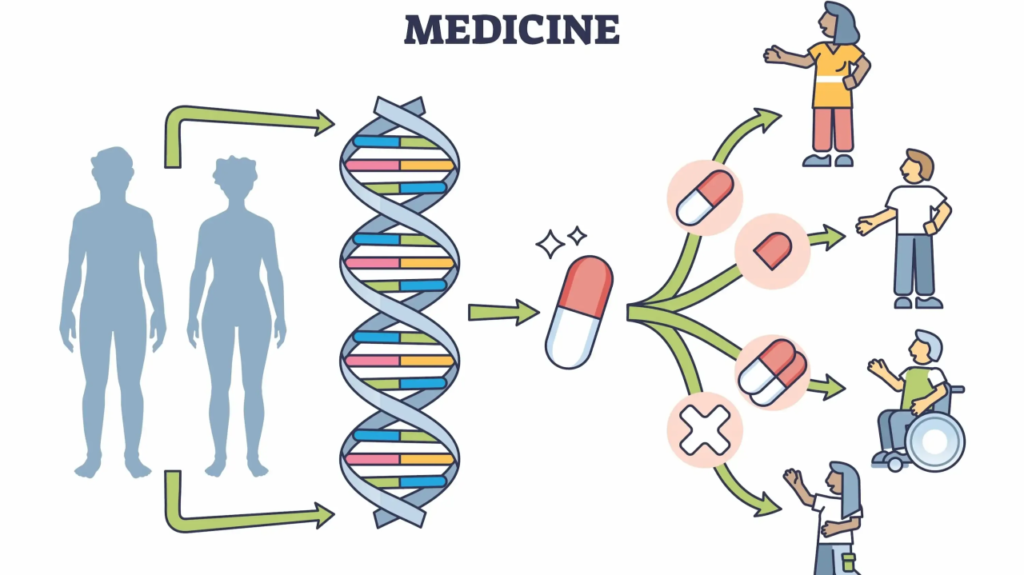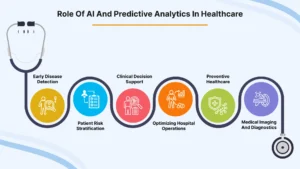AI in Precision Medicine: Tailoring Treatments to Individuals

Precision medicine, an emerging field in healthcare, aims to customize medical treatments based on the individual characteristics of each patient. This approach contrasts with the traditional “one-size-fits-all” model, where treatments are designed for the average patient. By focusing on genetic, environmental, and lifestyle factors, precision medicine strives to deliver more effective therapies with fewer side effects. Artificial intelligence (AI) is playing a pivotal role in the evolution of precision medicine, enhancing how healthcare providers understand, diagnose, and treat diseases at an individual level.
The integration of AI in precision medicine begins with data. AI algorithms can process vast amounts of data, such as genomic sequences, electronic health records, and patient-reported outcomes, which are critical to tailoring treatments. Traditionally, doctors would rely on broad clinical guidelines or trial-and-error methods when deciding the best treatment for a patient. However, with AI’s ability to analyze complex datasets, physicians can make more informed decisions, leading to more effective treatments tailored to each patient’s unique biology.
One of the most significant contributions of AI in precision medicine is its ability to analyze genomic data. Genomics, the study of genes and their functions, is at the heart of precision medicine. AI-powered tools can scan through an individual’s entire genome in a matter of hours, identifying mutations, gene expressions, and potential risks for specific diseases. By comparing these findings with large databases of genetic information from thousands of other patients, AI models can identify patterns that may go unnoticed by human analysts. These insights can inform doctors about the most suitable treatment plans for patients based on their genetic makeup, whether it involves specific medications, dosages, or alternative therapies.
For example, in oncology, AI is already being used to match cancer patients with the most appropriate chemotherapy drugs or immunotherapy based on their genetic mutations. The cancer genome is often highly variable between individuals, and certain mutations can make a patient’s cancer more resistant to standard treatments. AI algorithms can analyze genetic profiles to predict which drugs will be most effective, helping to avoid unnecessary treatments and reducing the chances of adverse side effects.
AI also plays a crucial role in optimizing drug development processes in precision medicine. Traditional drug discovery is a lengthy and costly process, but AI models can streamline the identification of potential drug candidates. By analyzing existing drug data and clinical trial outcomes, AI can predict how certain compounds might interact with the human body and whether they could be effective for treating specific genetic profiles. This accelerates the development of personalized drugs that can target the root causes of diseases at the genetic level.
Additionally, AI is enhancing the predictive capabilities of precision medicine by enabling the use of machine learning to forecast disease progression and outcomes. By continuously analyzing real-time data, such as vital signs, lab results, and imaging scans, AI systems can predict how a patient’s disease will progress, how they might respond to treatment, and even how they might react to certain environmental factors. For example, machine learning models can predict which diabetic patients are most at risk of complications like neuropathy or kidney failure, allowing for earlier intervention and personalized preventive measures.
Another critical area where AI is making an impact is in the creation of individualized treatment regimens. AI algorithms can analyze an individual’s full medical history, including lab results, medical imaging, and lifestyle factors like diet, physical activity, and stress levels. By considering all these factors, AI can help design personalized treatment plans that are far more likely to succeed than generalized protocols. This approach is especially beneficial for chronic conditions such as heart disease, diabetes, and autoimmune disorders, where treatment must be tailored to the individual’s unique needs.
Furthermore, AI’s role in precision medicine extends to improving patient outcomes through continuous monitoring and real-time adjustments. AI-driven wearable devices can track everything from heart rate and blood sugar levels to respiratory function, providing valuable data on how patients are responding to treatments. For patients with complex conditions or undergoing intensive therapies, these AI-powered tools can alert healthcare providers if something isn’t working as expected, enabling timely adjustments to the treatment plan.
Despite the remarkable potential AI brings to precision medicine, there are challenges to overcome. Privacy concerns around genetic data, regulatory hurdles in the use of AI-driven diagnostics, and the need for large, high-quality datasets to train AI models are some of the obstacles to fully realizing AI’s potential in precision medicine. Additionally, the integration of AI into clinical practice requires healthcare professionals to be trained in using these tools effectively and ensuring that they are implemented in a way that enhances, rather than replaces, the doctor-patient relationship.
The future of precision medicine powered by AI holds enormous promise. As AI technologies continue to evolve and healthcare systems become more adept at utilizing big data, personalized treatment will become the standard of care, transforming healthcare delivery and improving patient outcomes. Whether it’s through optimizing drug regimens, predicting disease progression, or tailoring treatments to the individual, AI is set to revolutionize the way we approach healthcare, offering a more personalized, effective, and patient-centered future.
Stay ahead with ITBusinessNews – Your trusted source for Technology and Business news. Fast & Precise




